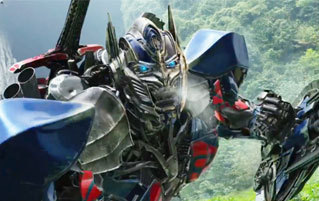5 World-Changing Trends That Will Transform Pop Culture

The worst thing that ever happened to the collective Screenwriters of the World was the invention of the cellphone. Seinfeld may still hold up pretty great for you today ('90s fashion is timeless, y'all), but think about that show from the perspective of someone who's 12 or 13 now. Half the "conflicts" in that (or virtually any '90s) sitcom could have been solved via a few hundred bucks worth of iPhone.
If you're like me, you entered your prime media-suckling days well after cellphones finally beat oral herpes in ubiquity among American adults. I remember a time before the masses carried phones in their pockets, but most of those memories are a hazy blur of shoulder pads and Gak. Thankfully, the shows my generation reached adulthood watching are safe. It's not like there are any other massive, plotline-genociding changes coming in the near future ... right?
The End of Labor

Even if it's not The Office or Mad Men, how a show's characters make a living matters. In Community, the fact that your characters really CAN'T exist in the professional world is a big part of the plot. And it's a rare romantic comedy that'll go 10 minutes without setting up what each of our protagonists do to afford their hilariously spacious downtown apartments.

The answer is always "architecture."
Here's the sad reality: Jobs are a dying breed of animal. Oh, sure, the herd's healthy enough now. But the loping gazelles of employment won't last long against the lions of modernization. And I'm not talking about cutting a few more factory jobs: The 5.7 million professional drivers in this country will soon have to compete with Google's much safer self-driving cars. And while this will mean a renaissance for getting drunk legally in cars, it also means millions of Americans are a few years away from losing their whole industry.
But hey, Taxi hasn't been on the air for years. It's not like robots are going to take over all our jobs in the next, like, 20 years. Only half of them, if the guys from Oxford University can be believed. And considering they have names like "Dr. Carl Benedikt Frey" and "Dr. Michael A. Osborne," I'm inclined to trust them. Both of those names could easily be the bad guy in a sci-fi horror, Spider-Man, or Die Hard movie.

Benedikt might be the most sinister name our alphabet can spell.
This study looked into all the jobs that were likely "susceptible to computerization over the next two decades." In addition to all those driving jobs, office and administrative support and service industry jobs were listed as high risk. And this doesn't just mean a disaster for all the English majors in your life. Think of the impact on Hollywood! Twenty years from now nearly all the television we love today will look as archaic as a TV series about John Henry, Steel-Driving Man.

Unless it's set in a post-apocalyptic future where John Henry must drive off the nefarious Legion of Steel ...
Robot Entertainment

Michael Bay movies -- and big-budget summer action movies in general -- almost seem dumb enough that they could've been written by a robot. But Transformers 2 actually had an astonishing three screenwriters. This does not say anything positive about man's unique creative potential. Robots are still a good ... nine-ish months off from writing Shia LaBeouf-worthy dialogue. But they're getting real close. A professor named Philip Parker has already created software capable of writing entire books on its own: There are over 100,000 in his Amazon store.

Take that, Faulkner.
And, yes, those books are on topics as maddeningly inane as "the 60 milligrams of fat in fromage frais," but by god it's a start. Scientists have already programmed robots capable of taking the terrible burden of low-level sports journalism off mankind's shoulders. And if robots can put together news articles capable of fooling the average reader, they can write dialogue at least as well as the average Michael Bay.
So we're headed toward a future where machines write our mass entertainment and handle our laziest journalism. And maybe that doesn't sound like a big deal, since most of the writers this would put out of business are utter hacks anyway. But any English teacher will happily tell you that what you read impacts how you write, and even think. I guess whether or not this is a bad thing comes down to whether you consider soulless algorithms a step up or down from Michael "Explosions Are My Commas" Bay and his pet screenwriters.

He can't even tell the difference between himself and a computer.
Human beings are risky because they get invested in crazy ideas like "giant robots battling monsters" or "quarter-billion dollar westerns." Blockbuster flops are expensive enough that they can actually kill a Hollywood studio. Why take that risk when you can just have a robot find the safest thing Mark Wahlberg can shoot to guarantee $300 million domestic?
We're Growing Indestructible

Medical science kicks more ass every day, and we're used to hearing about advances that help us fight cancer or delay AIDS or whatever. But scientists are also hard at work on a far more awesome set of developments. A robot liver is expected in 2014, which means we're only a set of robot lungs away from changing most "life-shortening addictions" into something you 3D print away.

Finally, a cure for exploding head syndrome.
Oh, and bulletproof skin is a thing now. Scientists at Utah State University used their transgenic goats and silkworms (which are apparently things that exist) to weave spider-silk cocoons, which were threaded into engineered human skin by a bioengineer in the Netherlands. So far the hybrid flesh can only stop bullets fired at half their normal speed. But that's a vast improvement over generic, store-brand human flesh, which is well known for stopping no bullets whatsoever.
And this whole insane piece of Ridley Scott-grade mad science was "just" an art project at its core. There's a zero percent chance the military won't look into bulletproof goddamn skin as soon as medical science catches up with our ability to exploit spiders. And like the Internet, functional invulnerability is bound to hit the civilian world just as soon as the cost comes down. Don't pretend you won't opt for the bulletproof skin upgrade as soon as it's more affordable than a shitty used car. This right here is the solution to America's gun crime problem: Make all the guns useless.

"Yes sir, we booked him for possession of a harmless noisemaker."
Sure, maybe we'll all just get better at aiming for the eyes. But whatever happens, it means a whole generation of screenwriters has some adapting to do. Neo-Swayze can't just get knifed at the start of the third Ghost reboot. Why would a man with spider-silk skin fear knives? He probably has fond memories of harmless, good-natured knife fights on the front lawn of his high school. A lot of great cinema is bound to lose its impact once firing squads, explosions, and car crashes stop being listed as a cause of death and start getting filed under "Hobby."
No More Delicious Fish

Did you guys know Finding Nemo was a period piece? It wasn't meant that way, but the whole reef ecosystem it re-creates in such vibrant color is dead. A few isolated pockets might be able to survive here and there, but scientists already consider the global reef system beyond saving.

After taking this picture, everything was churned into $4 worth of Long John Silver's.
In addition to making any Finding Nemo sequel depressingly similar to The Land Before Time, this means disaster for the reality TV industry: Future generations will look at our crab fishing and deep-sea hauling shows in utter bafflement, while they stay the hell away from the jellyfish filled hellpit that are the oceans they know. Callum Roberts, a professor at York University, predicts that the seas of 2050 will supply only half the fish protein needed by the hungry mouths of the world.
On the upside (if you're a jellyfish fetishist, as I assume all my readers are), jellyfish populations are exploding worldwide. Jellyfish blooms, which look like this ...

And feel like taking a needle enema.
... have increased in both size and frequency in recent years. In addition to being Mother Nature's way of making your brain shit its pants, these blooms are a sign that oxygen levels in the ocean have gotten so low that only murderous blobs of gelatinous death can thrive. So when the next generation's David Attenborough takes to the sea with a camera, we may have to settle for agonized shrieks in place of soothing British narration.
We've Decided to Trade Oil Wars for Water Wars

The good news: Hydraulic fracturing actually frees up a shitload of natural gas. More than enough to make "war over oil" even less necessary than it already was.

Finally, we can go back to fighting wars over meaningful things, like hat style.
The bad news: Fracking destroys our freshwater supplies faster than a coked-up screenwriter goes through tissues. Fracking is one of the two most significant causes of the water shortage in the U.S., and since the other cause is tar sand oil extractions, we really are trapped in a "one or the other" situation. There's simply no other way for the vast majority of our oil wells to stay productive.
Meaning the wars of the future will be fought over water, rather than oil.
And hey, from an entertainment standpoint that doesn't sound half bad. Until you think back to Hollywood's last attempts to render water-based strife: James Bond's Quantum of Solace and, Poseidon help us, Waterworld.

If we don't stop fracking now, this might get a reboot.
The clock is really ticking on this one, guys. The U.S. State Department expects the world need for fresh water to exceed the supply by 40 percent in 2030. We've got only a few short years to perfect the weaponized Jet Ski before it's too late.
Robert Evans has weaponized all sorts of things, and you can find more from him here. He'd like to bring your attention to a farm full of awesome people fighting rampaging bandits because they could really use your help.
Always on the go but can't get enough of Cracked? We have an Android app and iOS reader for you to pick from so you never miss another article.
